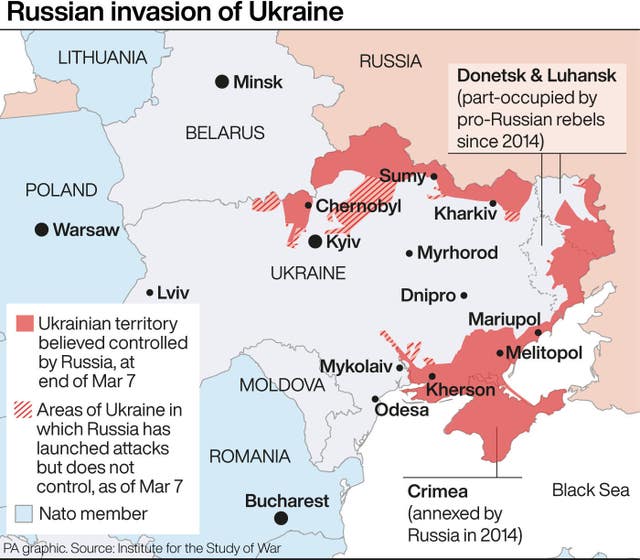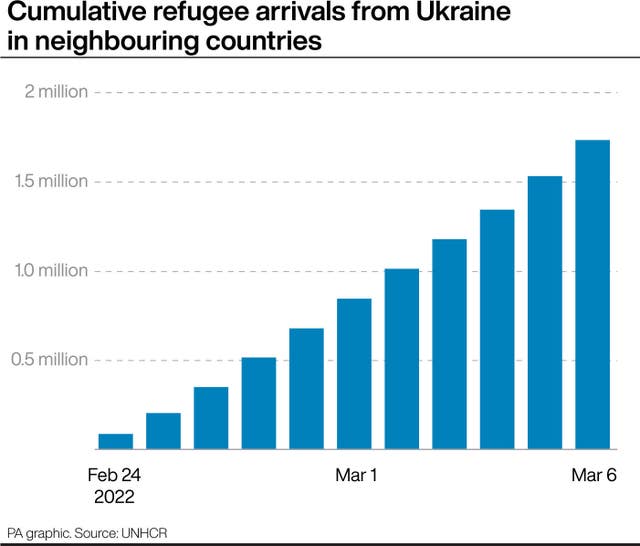‘Short supply’ of medical products in Ukraine – WHO
Global health officials also condemned attacks on medical facilities.

There is a “short supply” of essential medical supplies in Ukraine, health officials have warned as they condemned at least 16 attacks on healthcare services in the country.
The World Health Organisation (WHO) said there had been 16 attacks on healthcare services, including damage to facilities and hospitals, as well as the commandeering of ambulances and the diversion of emergency ambulances.
These attacks have led to nine deaths and 16 injuries, the WHO said.
The European arm of the global health body also said there is a shortage of essential supplies in Ukraine, including oxygen, insulin, surgical supplies and blood.

Experts also warned that Covid deaths would rise due to a lack of oxygen supply in the region – with 731 deaths reported last week.
Meanwhile health officials raised concerns about cases of hypothermia – where a person’s body temperature becomes dangerously low – among refugees out in the cold weather.
They also highlighted fears over the maternity care for Ukrainian women who are pregnant, with an estimated 80,000 women expected to give birth in the country over the next three months.
In a press briefing on the humanitarian crisis which has arisen from the conflict, Dr Hans Henri Kluge, the WHO’s regional director for Europe, said: “It is now 13 days since the military offensive began in Ukraine, and today within the country we see a health system under severe pressure, and beyond its borders the fastest growing refugee crisis in Europe for more than 75 years.
“Life-saving essential medicines, such as oxygen and insulin, personal protective equipment, surgical supplies, anaesthetics and safe blood products, are in short supply.”
He said 76 tonnes of trauma and emergency health supplies are in transit in Ukraine, with more en route.
The WHO is also working to ensure that refugees crossing the border have access to healthcare and that those who remain in the country also have support.
Dr Kluge added: “It should not need saying that health workers, hospitals and other medical facilities must never be a target at any time, including during crises and conflicts. To date, we have 16 confirmed reports of attacks on health in Ukraine, and more are being verified.
“WHO strongly condemns these attacks on healthcare services.”
Dr Catherine Smallwood, WHO Europe’s incident manager for Covid-19, said: “We have had documented or verified 16 attacks with different levels of certainty.
“These have led to, what we know of, at least nine deaths and 16 injuries, and they’ve happened in various large cities and around the areas of conflict line.
“This includes direct attacks against health facilities or hospitals that have been damaged.
“This also includes appropriating health infrastructure such as ambulances, it includes diverting ambulances and using them for purposes that are not directly related to the provision of healthcare.”
Dr Kluge praised Ukrainian health officials for continuing to monitor the spread of Covid-19, but added that “731 Covid-19 deaths were reported to WHO from Ukraine last week, and sadly this number will increase as oxygen shortages continue”.
He said: “Older people will be disproportionately affected as their access to healthcare is disrupted, and because only one third of the over-60s are fully protected with a complete vaccine series.”
Asked about humanitarian corridors, Dr Kluge said: “The clock is ticking so in that sense by hook and by crook we need to get whatever we can to the affected areas.

“We know from previous conflicts, when more doors are being closed, the health diplomacy becomes the key one.
“Our principle is health for all and our top priority is to get the life-saving humanitarian medical supplies to people in need.”
On maternity care, Dr Isabel Yordi Aguirre, WHO Europe’s technical officer for gender and human rights, said: “The UNFPA (United Nations Population Fund) estimation that 80,000 women will give birth in the next three months in Ukraine means that those women may have moved from having a life-changing experience to a life-threatening experience.
“UNHCR (United Nation Refugee Agency) projects that in July this year we will have four million refugees, and that will mean approximately 1,000 births per week that will be anticipated.
“So that’s why we have to ensure sexual reproductive health services should be at the core of our assistance to both women – refugees crossing the borders and also women who stayed behind.”
Tarik Jasarevic, WHO representative on the ground in Ukraine, told the briefing: “It is heartbreaking to see hundreds, if not thousands of people at the border between Ukraine and Poland – mainly women and children looking to be processed and looking for safety.”
He added: “In the east, hundreds of health facilities are either areas that have changed control or along fighting lines or within 10 kilometres of that.
“Healthcare facilities need supplies, they need power, they need water.
“I just talked to a doctor who is in touch with her colleagues in the most affected areas in the east and she was telling me that people cannot access health centres and hospitals because of security and damage to structure.
“And that’s not only the case with patients but also for health workers who are risking their lives to get to their workplace.”





